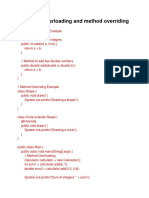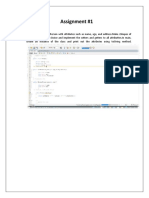0% found this document useful (0 votes)
8 views1 pageAssignment Abstraction
The document outlines a series of programming tasks involving the creation of abstract classes, subclasses, and method overriding in an object-oriented programming context. It includes examples such as defining shapes, media types, vehicles, and libraries, as well as demonstrating the use of final classes and parameters. Additionally, it covers inheritance concepts, including accessing parent class methods and variables, and the implications of final methods in multi-level inheritance scenarios.
Uploaded by
Shivanand S LikkeCopyright
© © All Rights Reserved
We take content rights seriously. If you suspect this is your content, claim it here.
Available Formats
Download as DOCX, PDF, TXT or read online on Scribd
0% found this document useful (0 votes)
8 views1 pageAssignment Abstraction
The document outlines a series of programming tasks involving the creation of abstract classes, subclasses, and method overriding in an object-oriented programming context. It includes examples such as defining shapes, media types, vehicles, and libraries, as well as demonstrating the use of final classes and parameters. Additionally, it covers inheritance concepts, including accessing parent class methods and variables, and the implications of final methods in multi-level inheritance scenarios.
Uploaded by
Shivanand S LikkeCopyright
© © All Rights Reserved
We take content rights seriously. If you suspect this is your content, claim it here.
Available Formats
Download as DOCX, PDF, TXT or read online on Scribd
/ 1





























































